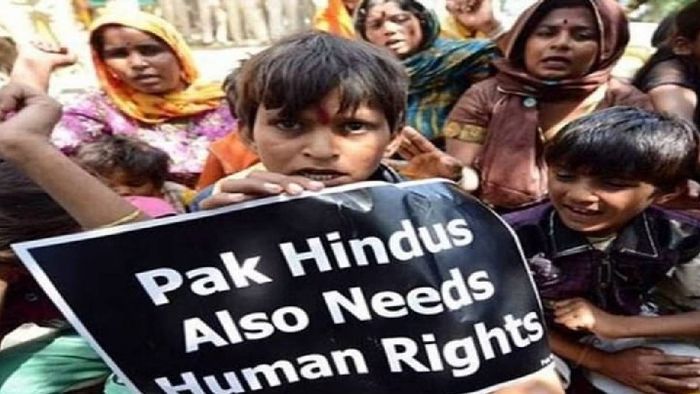Pakistan omits budget allocation for Hindu and Christian minorities
Pakistan's 2024-25 federal budget has omitted the allocation for Hindu and Christian minorities, which was 100 million Pakistani rupees in 2023. Minority leaders have criticised this decision, calling it a setback for their communities.

- Jun 14, 2024,
- Updated Jun 14, 2024, 10:48 PM IST
Pakistan’s budget allocation which was 100 million Pakistani rupees for the welfare of religious minority communities in 2023, was omitted from the 2024-25 federal budget and no explanation was cited.
Following the same, Pakistani minority leaders called the new budget a setback for the development of minorities like Christians, Hindus and Sikhs, whose numbers are dwindling anyway. They criticised the government for not allocating funds for their welfare in the new national budget.
It may be mentioned that religious minorities, including Christians, Hindus, and Sikhs, make up less than 5 per cent of Pakistan's 244 million population, with Hindus and Christians each constituting 1.6 per cent.
Federal Finance Minister Muhammad Aurangzeb presented the Federal Budget for Pakistan for 2024-25 on June 12, totalling 18.87 trillion rupees ($68 billion).
The budget included 1,861 million rupees for the Ministry of Religious Affairs and Interfaith Harmony, an increase from the previous year's 1,780 million rupees, covering funding for Hajj pilgrims to Mecca.
However, the budget allocation for the welfare of religious minority communities was entirely omitted this year, according to media reports.
Meanwhile, Pakistan's budget for Defence Affairs and Services has increased by around 17 per cent with this year's allocation totalling around 2.12 trillion Pakistani rupees.
After the budget was announced, minority leaders have been concerned about the impact of this decision, especially on students who rely on scholarships and support during religious festivals.
“The fund was scarce from the beginning. Now, the fund has completely vanished, just like the minorities’ ministry at the federal level. Our students will suffer. They need government support,” UCA news quoted Ejaz Alam Augustine, former minister for human rights and minority affairs in Punjab.
In 2008, Pakistan established its first Federal Ministry for Minorities.
Shahbaz Bhatti, a Catholic, was appointed as the minister but was assassinated in 2011. Later, the ministry was merged into the Ministry of Religious Affairs and Interfaith Harmony in 2013. As per media reports, a Sikh educationist said that minority communities, like Sikhs, haven't seen specific support from the government.
Declared non-Muslim by the Pakistani constitution in 1974, the Ahmadiyya Muslim sect faces persecution from Sunni Muslim hardliners.
“We do not consider ourselves minorities. However, the state policies equally affect us,” said Amir Mahmood, a spokesman for Pakistan's Ahmadiyya community, reported UCA News.
Chaman Lal, chairman of Samaj Sewa Foundation Pakistan, expressed concern over declining support for religious minorities. He noted that decreased funding and increased attacks on vulnerable communities, as per reports. Lal urged for more efforts towards minority empowerment and questions the performance of minority representatives in provincial legislative houses.
Religious minorities, including Christians, Hindus, and Sikhs, make up less than 5 per cent of Pakistan's 241 million population, with Hindus and Christians each constituting 1.6 per cent. Church sources claim that only 34 per cent of religious minorities, including Christians, are literate, and just about 4 per cent pursue university education. Only 18 per cent of marginalised Dalit people, officially known as scheduled castes, are literate, as per media reports citing Chaman Lal.